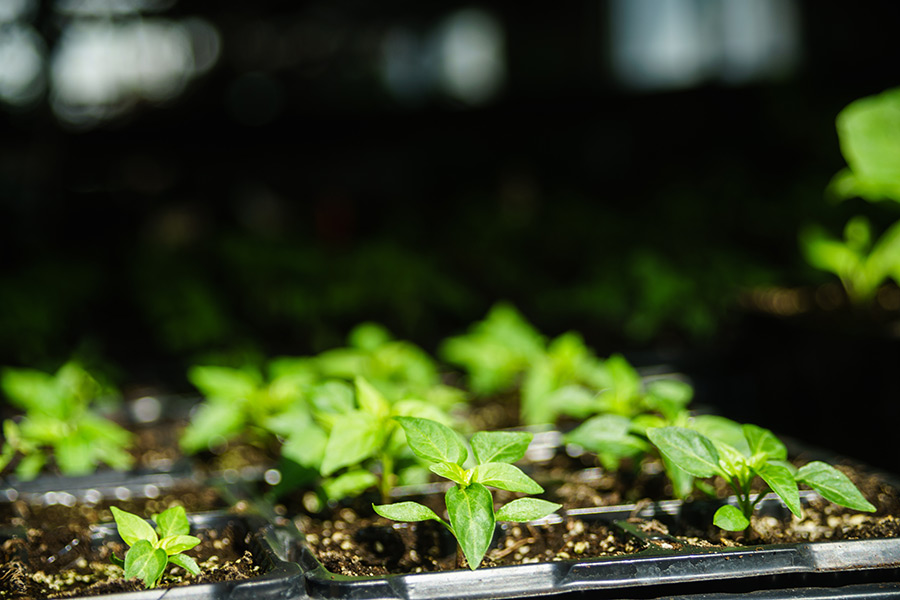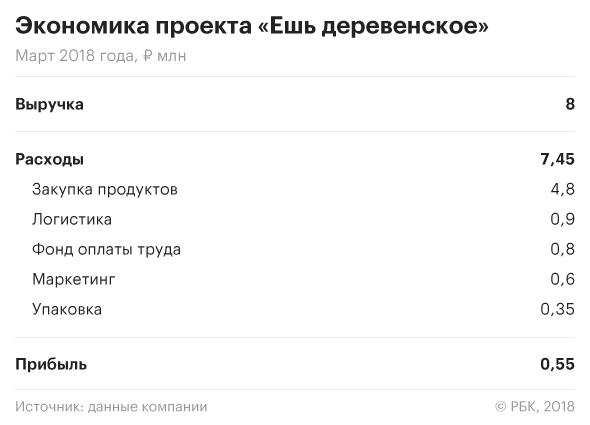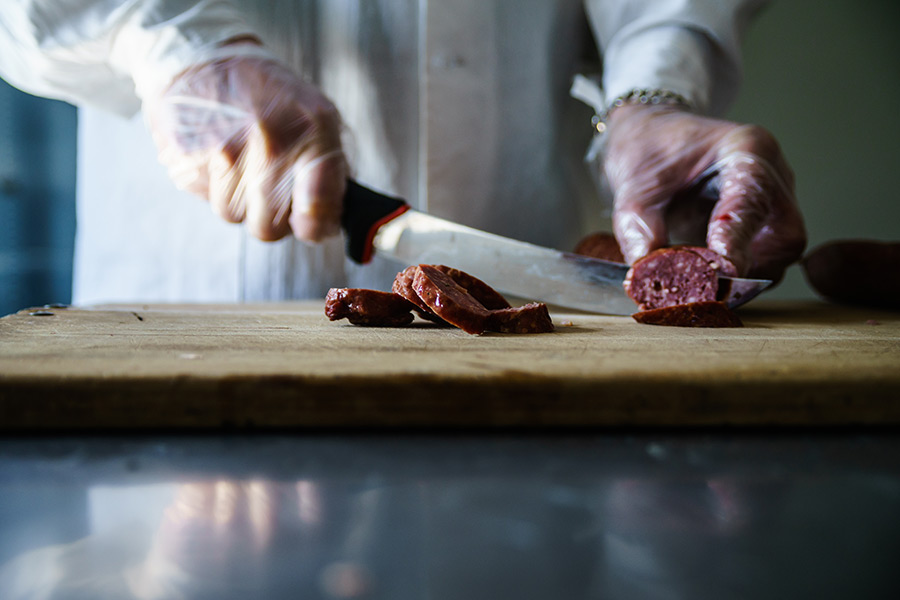Site sections
Editor's Choice:
- Business with China - where to start, how to find suppliers + TOP-15 goods from China and a list of trading platforms
- Where to invest 1000 dollars
- Three common misconceptions and six life tips
- How can maternity capital be used - what needs can be spent on maternity capital
- Caramel apples - a new idea for business
- Ready business plan for beginners
- Gypsum tiles for stone: 7 advantages of the material
- How to buy the best and interesting unusual goods from China for home, gifts and sale on Aliexpress in Russian?
- Business plan for opening a bath
- Where to spend maternity capital before the child is 3 years old
Advertising
| Internet farmers: how to make money at the intersection of agriculture and IT |
|
The founder of the Eish Derevenskoye company, Ilya Elpanov, failed to become a successful farmer, but instead attracted about 19 million rubles. investments and created a community of rural residents from whom Muscovites buy food for 8 million rubles a month. Following Tesla Elon Musk, a meteorological balloon with a set of village products went into space to "feed the electric car driver." This marketing campaign was invented by the team of Ilya Elpanov, the founder of the Eish Derevenskoe company. “So we showed that among us, the villagers, there are Ilona Masks, there are many of them,” the businessman says with a serious face. Residents of Moscow and neighboring villages are not separated by space, but finding products from small rural producers in the capital's markets and in stores is not easy. Farmers are rarely able to provide the volumes and prices that retailers and wholesalers demand of them. 26-year-old Elpanov decided to fix this by creating a marketplace for farm products on the Internet. How it works Eat Village is not a traditional online store. The prices here are set by the suppliers, and the platform adds its commission of 25-35%. Each product page has a story about the farmer who grows and supplies it, as well as customer reviews. Farmers control demand: in their personal account on the site, they indicate how many units of products can be prepared this week. They help promote the product: they take photos and videos for social networks. According to Elpanov, the company sells not only products, but also the history of each farmer. Suppliers are responsible for labeling and delivering products to the company's distribution center in Dubna, from where Elpanov's drivers deliver parcels across Moscow and the region twice a week - on Thursdays and Sundays. When ordering up to 3.5 thousand rubles. delivery costs 249 rubles, from 5 thousand rubles. - is free. Foxes and schoolchildren In the summer of 2013, after the third year of economics at the Moscow Agricultural Academy. Timiryazeva, Ilya Elpanov with fellow students went to the Kaluga region. The organizers of the Nikola-Lenivets art park then allocated land plots to six people wishing to engage in agriculture and about 1 million rubles for the purchase of animals and feed. But things did not go as smoothly as the enthusiasts expected: Elpanov's geese were eaten by foxes, the pigs of friends-partners ran into the forest. After spending several months and fixing 500 thousand rubles. losses, the students abandoned the venture. Elpanov decided that you need to be born a farmer or spend 10-15 years to become a professional in this area. Elpanov was a member of the Russian Economy Foundation community, where he was mentored by serial entrepreneur Oskar Hartmann. After the first failure, the mentor advised him to try his hand at IT. Together with a friend, Elpanov began to develop an application for preparing schoolchildren for the exam in a playful form, Smart Fox. In 2014, the startup received about $ 25 thousand in investments from the Internet Initiatives Development Fund, but quickly went bankrupt. Monetization was based on the concept of freemium, when the main service is provided free of charge, and you have to pay for additional features - 1.5 thousand rubles. It turned out that schoolchildren are actively using the free functionality, but are not going to pay. When the startups realized this, the money ran out, and the exam preparation season was over. Then Elpanov decided to work for hire - he got a job at the Elementaree company, which delivers food by subscription. Over time, he took the position of head of the logistics department. It was here that he figured out how to combine agriculture and IT. Village community Elpanov spied the idea for a new business in Slovakia, where farmers sold food through an online store. In April 2015, he moved to the Tver region, to the city of Kimry, began collecting sets of village products from the local market and selling them to relatives and friends in the capital. The entrepreneur had 50 thousand rubles to start the business. This money was spent on the purchase of a website template in the Joomla constructor, a refrigerator and two thermoboxes for transporting products. At the start, he was joined by Dmitry Zavyalov, the husband of Elpanov's sister. The rest of the friends were perplexed: how can you quit a good job in the capital and move to the provinces for the sake of an incomprehensible undertaking? It quickly became clear that reselling goods from the market would not make much money, and the partners began to look for suppliers among farmers - they managed to find several manufacturers of dairy products, poultry, vegetables and herbs. The assortment was limited, so at first Eat Derevenskoye sold food sets for 2 thousand and 3 thousand rubles. The partners spent 10 thousand rubles. for advertising on social networks and received eight orders. Their day began at 4 am when they collected packages and personally delivered them to customers. Elpanov decided that the goods should be delivered from the farmer to the buyer's home within 24 hours, which means that stocks cannot be created and delivery times must be limited - the products were delivered once a week, on Sunday. The first parcels were collected in the kitchen in the apartment of Elpanov's mother. In six months, the number of orders increased to 40 per week, and the entrepreneur rented a distribution center closer to the capital - in Dubna (they pay 75 thousand rubles a month for 140 sq. M.). Among the main buyers were women 25-35 years old with small children, people who monitor proper nutrition, and those to whom village parcels resemble childhood. “The taste qualities of the products differ significantly from what we buy in stores,” one of the customers, Dinara Mikhailova, told RBC. It soon became clear that the standard premise business model was failing. Some of the buyers do not eat certain products and want to order something else. Therefore, in the spring of 2017, the entrepreneur decided to open also a marketplace with a wide range of goods (now it brings 60% of the revenue). It was more difficult to work in this format. Once one of the dairy suppliers did not make an already ordered strawberry-flavored yoghurt. Only 20 bottles were needed, but the farmer did not have time. Elpanov somehow begged him to finish the game, and then personally came to him at 4 in the morning, spending 2.5 hours on the road. “The cost of these cans was enormous. But still, reputation is at stake, ”explains the entrepreneur. Then Elpanov got into a truck and went to deliver parcels around Moscow. There were difficulties in connecting suppliers from the Krasnodar Territory. For example, an entrepreneur sent a Gazelle truck for Peking cabbage, but due to heavy rains they could not collect it. The car returned empty, Elpanov lost about 40 thousand rubles. Another time, on the way back, the motor broke down, the refrigerator stopped working - half the batch had to be thrown away. Therefore, now the majority of Eat Derevenskoye suppliers are from Tver, Moscow and Kaluga regions. In his distribution center, the entrepreneur created a quality control system, which was helped by specialists from Azbuka Vkusa - they were recommended to Yelpanov by Vladimir Sadovin, an acquaintance of the entrepreneur and general director of Azbuka Vkusa. Now unscrupulous suppliers are fined from 1 thousand rubles. up to 50% of the cost of the batch. But due to the large number of different suppliers, mistakes still happen: on average, 15 orders out of 400. Company representatives personally visit the farms: they ask for receipts to find out where and when the feed was purchased, conduct laboratory tests and tasting commissions. New farmers For two and a half years, Yelpanov toured 300 farms. The founder of Eat Dereveskoye divides suppliers into three types: people who were born in the countryside and have been engaged in agriculture since childhood; entrepreneurs who are tired of the city and decided to make money on farming; and amateurs who have turned their summer cottage hobby into an additional source of income. More successful than others, according to the statistics "Eat the village", are precisely the townspeople who decided to become farmers. Dmitry Slavyansky is one of the first suppliers of Eat Village. He started farming in 2014. Prior to that, he tried himself in the restaurant business, went from a cook to a manager. But Slavyansky was drawn to the ground: “It was always interesting to poke around in the garden. Probably it's genes. " He started in 2014 with growing mushrooms. But I did not calculate the expenses, the cost of the products turned out to be higher than the market one. Then I decided to "get my hands on" the greenery: put the first greenhouse. Six months later, he grew 12 tons of onions a month, kept 28 people in the state. But by 2016, there was an overstocking in the onion market - the entrepreneur received 1.5 million losses. “So much effort and money was invested, it would not be in my rules to say“ everything, I didn’t do it ”,” recalls Slavyansky. The farmer rented 12 hectares 20 km from Tver and switched to growing lettuce, zucchini, radish and seasonal greens. I sold it to local restaurants. This business has proven to be profitable. “We ourselves also had thoughts about delivering farm products to Moscow, we simply could not realize it,” says Slavyansky. At first, "Eat Dereveskoe" received five to eight orders a week, now the bill goes to dozens. The company pays invoices once a week, and other wholesalers usually delay payments for a month. The farmer loves that he knows customers by sight: every week he looks at the page with reviews of his products. Slavyansky's revenue for 2017 amounted to about 10 million rubles. He does not disclose the profit. Another supplier, Vadim Roshka, received a higher religious education, in the 1990s he worked as a lawyer and then as a traffic police inspector. All this time he was running a subsidiary farm. Gradually, the income from it began to exceed the salary. In 2007, he quit his job and switched to farming in the Tver Region - raising cattle (his farm has 150 cows) and producing dairy products. According to Rosca, the modern farmer has a tough time. Electricity bills rise, fuel prices rise, and milk prices remain unchanged. “So much has been done that there is no turning back. We survive on enthusiasm, ”says the farmer. To stay afloat, he is developing his online store, selling products through groups on social networks and looking for new distribution channels. “For Eat Derevenskoe, we have become the main supplier of dairy products - production volumes increased tenfold last year. We grow together, ”explains the farmer. Revenue for 2017 amounted to more than RUB 10 million. He reinvests all profits in business development. Along with the groceries, Eat Derevenskoe customers receive a letter about how things are going in the village. Ilya Elpanov also plans to install cameras with online broadcasting on farms so that buyers can check the origin of products. 5 billion for farmers In Moscow, there are both farm products delivery services and offline stores where such food can be purchased. The main competitors of Eat Derevenskoe are LavkaLavka, Seasonmarket, MoscowFresh, Fresh, Two Sisters, etc. According to expert estimates, the largest player is LavkaLavka cooperative with a chain of stores and online delivery. According to LavkaLavka, the chain occupies about 10% of the capital's market for farmers' products, with an annual turnover of 5 billion rubles. However, according to Elpanov, the more retail players there are on the market, the more farmers will be able to supply their products to the megalopolis and the cheaper their products will be. Money on the table The founder of "Eat dereveskoe" attracted the first investments in the summer of 2016 - 1 million rubles. in exchange for 8% of the company from business angels Grigory Rudanov and Vladimir Batishchev. According to Rudanov, Ilya impressed investors with his dedication and dedication. “The market has great potential because more and more people want to eat healthy. We see that farm products are in great demand. Ilya made a very humane service, ”explains Rudanov. In 2017, the company received another $ 300 thousand for about 20% from the founder of the LiveTex company Vladimir Bakuteev and the Some Random VC fund. This money helped the company grow rapidly. The assortment has significantly replenished: there were 150 product names, now 800. The number of suppliers has grown almost four times - up to 150. If at the beginning of 2016 the project's revenue was about 400 thousand rubles. per month, then by the beginning of 2017 - 1.8 million rubles, now - about 8 million rubles. According to Elpanov, the company has reached an operational payback, but he spends all the profit on the development of the project. In 2018, Eat Dereveskoye has a new sales channel: now the company supplies products to hotels, restaurants and offices. “The guys are promoting values similar to ours. They take the product seriously and work on bugs, ”Anastasia Efimova, co-owner of Brick Design Hotel, explains the choice of a supplier. According to Elpanov, 4.5 million residents of the capital prefer farm products, but in reality no more than 1% of potential buyers make online purchases. “Now farm products are quite expensive, but with the right business approaches and automation of work with suppliers, they will become available,” Elpanov is sure. View from the outside "The phrase" farm product "no longer causes wild enthusiasm" Alexander Goncharov, founder of the farm cooperative "Mark and Lev" “There is nothing revolutionary in the idea of delivery, but supporting the villagers is right. True, I see "Eat Village" has a random set of suppliers. It is necessary to develop the territory where farmers live, as, for example, our Tula agrohub is doing. The phrase “farm product” no longer arouses wild enthusiasm among consumers, stratification occurs - some are looking to make it look like a farm product, but cheaper, others are interested in the origin of the product, environmental friendliness needs proof. " "The main problem now is the heterogeneity of raw materials." Pavel Paskar, CEO of Grow Food food delivery service “I think the idea of home delivery of groceries is very promising. Now the market is divided into a number of models: delivery of cut ingredients, in which a person cooks himself according to a recipe, for example, Chefmarket, cooking in the retail itself, like Azbuka Vkusa, subscription models when food arrives ready-made, for example, Grow Food. This market is changing for the better and growing. Leaders show good results, competitors are catching up with them. Technologies come into our lives, in large cities where people do not have enough time, they outsource more and more processes. The market will continue to grow for another three to five years. The main problem now is the heterogeneity of raw materials. Large companies are forced to cook not the best products. This affects the quality of the food. If we manage to create as few layers as possible between consumers and farmers, the better from an economic point of view: both the goods will become cheaper and the companies will become more profitable. Delivering farm products is an interesting idea. " |
| Read: |
|---|
Popular:
Power and energy measurement
|
New
- Tired MPs want to give Russians a two-hour lunch break. Concepts and categories
- Massage covers Relaxation cape
- Relaxation cover Ergopower ERSC7H Contraindications and benefits of massage cover
- How to pay for utilities directly to the resource supplying organization When we pay directly to utility providers
- Recommendations for finding a job abroad for Russians, Ukrainians, Belarusians
- Forgot the code word belagroprombank How to set up a mobile key belagroprombank
- The habits of rich people: behavior, thinking and interesting facts What makes a person rich ask
- Belagroprombank personal account Fransabank internet banking login
- How to make money on agricultural tourism in Russia How to open an agricultural estate in Belarus
- How much is the labor of a kindergarten teacher in our country and in other countries?








